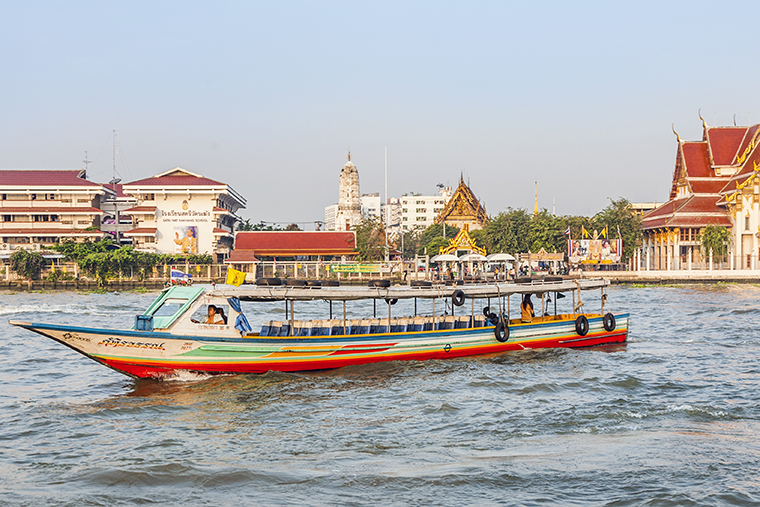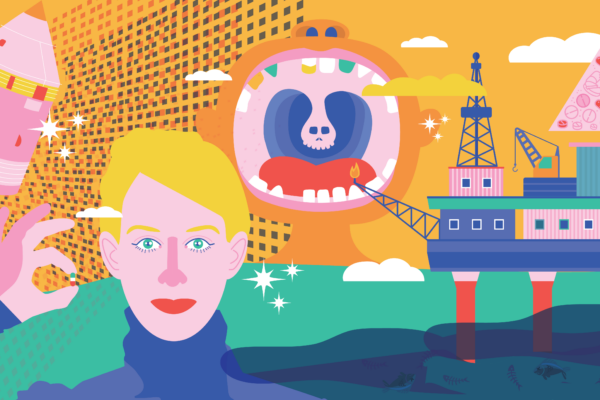A sudden downpour on a Bangkok riverboat tour sent members of the “Global Urbanism Studio” into action, pulling down the canvas sides of the boat for shelter.
“It happened all at once and was a fast moment where everyone worked together to ‘batten down the hatches,’” says Rachel Stagner, a student in the studio and a member of the 2022 Master of Urban Design cohort. “That is a moment I won’t forget.”
Working together to deal with the force of water was a focus of this year’s course. The 20 students in the studio examined the ways people live with and try to control water while gliding through Bangkok’s canals on the boat tour, winding along a river in the Thai highlands on a 100-year-old train, and planting mangrove trees in knee-deep mud.
The 13-week “Global Urbanism Studio” is the capstone course in the three-semester Master of Urban Design (MUD) program and is also open to other master’s degree students in the Graduate School of Architecture & Urban Design, part of the Sam Fox School of Design & Visual Arts. Each year, the course focuses on an urban issue — such as water mitigation, open-air city markets or pandemic resiliency — in an international city or cities, exposing students to urban issues and systems that don’t necessarily exist in the U.S.
“It’s an opportunity to reconsider our expectations,” says Jonathan Stitelman, MArch ’11, MAUD ’11, studio lead and senior lecturer in the Sam Fox School. “I hope students see that there is no one answer when you’re designing a city.”
Since 2008, students have analyzed Tokyo; Johannesburg, South Africa; Dubai, United Arab Emirates; Kampala, Uganda; Mexico City and Tijuana, Mexico; Singapore; and Hong Kong.
The Thailand visit was the studio’s first trip after two years of virtual travel. Stitelman says the pandemic created an opportunity for him to rethink the studio’s structure with Derek Hoeferlin, associate professor and chair of landscape architecture and urban design. As a result, students spent more weeks this year doing on-the-ground research. They were guided by boat, train and car through Thailand by Danai Thaitakoo, a lecturer from Chulalongkorn University in Bangkok, who told them that 21st-century urban designers must work with natural systems in mind and recognize the fluidity of life along the river. And Kotchakorn Voraakhom, a landscape architect and Bangkok native, led students through her public space projects that mitigate flood risk. She is currently a designer-in-residence at the Sam Fox School.
Then the students formed teams to address five problem statements (see sidebar above) in a workshop format designed to confront urban problems and predict future scenarios. Students from Chulalongkorn University joined WashU students to delve into these questions.
‘It’s been awesome to have our classroom on the road. I think those are some of my favorite moments of teaching, when you realize: “Oh, I’m in absolutely the right place right now.” ’
Jonathan Stitelman
After studying rivers and other water issues for a month in Thailand, the students took a weeklong trip from New Orleans to St. Louis to study the same issues on the Mississippi River. Led by Hoeferlin, students visited the Army Corps of Engineers Designing With Nature research group and saw significant water-control infrastructure along the lower Mississippi.
“New Orleans and Bangkok made so much sense as sister cities,” Stitelman says. “They’re both built in a delta. They’re both having subsidence issues. They both have coastal flooding and coastal erosion. They’re both historic places.”
During the studio’s last six weeks back in St. Louis, students reflected on what they’d seen and created designs based on the problem statements they addressed in the workshops. The travel experiences proved illuminating.
“Just to see the incredible urban context in Bangkok and how water has shaped the identity of the city was instructive,” Stagner says.
“I think the most valuable aspect was the comparison of how the Mississippi River and the Chao Phraya River in Thailand have been influenced by humans through time,” says Weicong Huang, also a member of the 2022 MUD cohort.
The trip, Stitelman says, was the first year of a probable multiyear engagement with Thailand — similar to a previous focus on Johannesburg.
After teaching the studio remotely for two years, Stitelman enjoyed exploring the world again. “It’s been awesome to have our classroom on the road,” he says. “I think those are some of my favorite moments of teaching, when you realize: ‘Oh, I’m in absolutely the right place right now.’”






